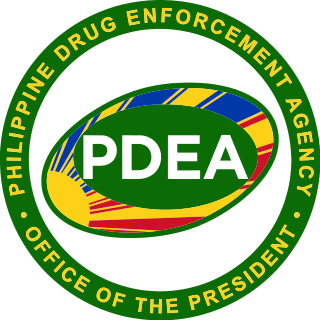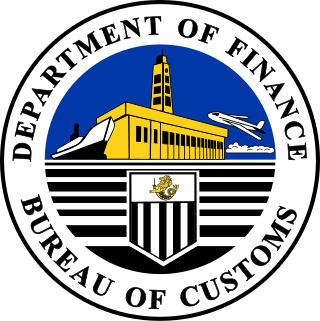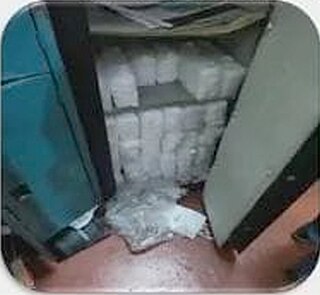
The illegal drug trade, drug trafficking, or narcotrafficking is a global black market dedicated to the cultivation, manufacture, distribution and sale of prohibited drugs. Most jurisdictions prohibit trade, except under license, of many types of drugs through the use of drug prohibition laws. The think tank Global Financial Integrity's Transnational Crime and the Developing World report estimates the size of the global illicit drug market between US$426 and US$652 billion in 2014 alone. With a world GDP of US$78 trillion in the same year, the illegal drug trade may be estimated as nearly 1% of total global trade. Consumption of illegal drugs is widespread globally, and it remains very difficult for local authorities to reduce the rates of drug consumption.

The Philippine Drug Enforcement Agency is the lead anti-drug law enforcement agency, responsible for preventing, investigating and combating any dangerous drugs, controlled precursors and essential chemicals within the Philippines. The agency is tasked with the enforcement of the penal and regulatory provisions of Republic Act No. 9165, otherwise known as the Comprehensive Dangerous Drugs Act of 2002.
The Colima Cartel was a Mexican drug trafficking and methamphetamine producing cartel operating in Guadalajara, Jalisco. It was founded and led by José de Jesús Amezcua Contreras and supported by his brothers Adán and Luis.

The Sinaloa Cartel, also known as the Guzmán-Zambada Organization, the Federation, the Blood Alliance, or the Pacific Cartel, is a large, transnational organized crime syndicate based in the city of Culiacán, Sinaloa, Mexico that specializes in illegal drug trafficking and money laundering.

The illegal drug trade in Latin America concerns primarily the production and sale of cocaine and cannabis, including the export of these banned substances to the United States and Europe. The coca cultivation is concentrated in the Andes of South America, particularly in Colombia, Peru and Bolivia; this is the world's only source region for coca.

The Bureau of Customs is a Filipino government agency that is responsible for the collecting of customs duties, excise duties, and other indirect taxes in the Philippines. It is part of the Philippines Department of Finance.

Colonel Ferdinand Marcelino is an active Marine officer of the Philippine Navy, a graduate of the Philippine Military Academy, class of 1994. Born in Hagonoy, Bulacan, he is the eleventh of 13 children of a fisherman and a housewife. He is currently serving as Provost Marshal General of the Armed Forces of the Philippines with the rank of Brigadier General.

In the early morning hours of May 22, 2016, five people died after taking alleged illegal drugs during a rave dance party organized by Close-Up entitled Forever Summer, at the SM Mall of Asia concert grounds in Pasay, Philippines.

The War on Drugs is the intensified anti-drug campaign that began during the administration of President Rodrigo Duterte, who served office from June 30, 2016, to June 30, 2022. The campaign reduced drug proliferation in the country, but has been marred by extrajudicial killings allegedly perpetrated by the police and unknown assailants. By 2022, the number of drug suspects killed since 2016 was officially tallied by the government as 6,252; human rights organizations and academics; however, estimate that 12,000 to 30,000 civilians have been killed in "anti-drug operations" carried out by the Philippine National Police and vigilantes.
Philippine President Rodrigo Duterte made a speech at the Naval Station Felix Apolinario in Camp Panacan, Davao City on August 7, 2016. In the speech, delivered shortly after midnight during his wake visit to four NavForEastMin soldiers killed during clashes with the New People's Army in Compostela Valley, Duterte revealed the names of 150 public officials, including mayors and other local government executives, legislators, police, military and judges, found to be involved in illegal drug trade. He described the drugs situation in the country as "pandemic" after 600,000 drug dealers and dependents have surrendered to the police in just one month since he took office.

The New Bilibid Prison drug trafficking scandal is a criminal investigation and political scandal concerning allegations of government involvement in illegal drug trade at the New Bilibid Prison in Muntinlupa, Metro Manila, Philippines. The allegations were made by President Rodrigo Duterte after announcing that the two top convicted drug lords in the country continued to run their drug rings from inside the national penitentiary with former administration officials and their local government cohorts as co-conspirators. On August 25, 2016, Duterte released a drug matrix showing the structure of drug trafficking operations at the New Bilibid Prison and identified the two former top officials of the Department of Justice, the former provincial governor and board member of Pangasinan, and the former Bureau of Corrections director as being involved in the Bilibid narcotics trade.

Rolando Rosal Espinosa Sr., the mayor of Albuera, Leyte, died on November 5, 2016, at the Baybay City Provincial Jail. He was detained at the jail due to his arrest for illegal drug possession in October 2016. According to the Criminal Investigation and Detection Group (CIDG), Espinosa was killed during a shootout that he initiated when the CIDG came to the jail to serve him a search warrant. Espinosa's death occurred amid allegations that he was involved in the drug trade by President Rodrigo Duterte, who initiated the Philippine Drug War intending to kill criminals using or distributing drugs. The Commission on Human Rights and Karapatan have held Duterte accountable for Espinosa's death, with Senate condemning the death as an instance of extrajudicial killing.

The cultivation and use of cannabis is illegal in the Philippines under Republic Act 9165 or the Comprehensive Dangerous Drugs Act of 2002. As the Philippines is a signatory to the 1961 United Nations Single Convention on Narcotic Drugs, Cannabis is classified as a Schedule I drug, which limits its use to medical and scientific purposes. Marijuana is the second most used drug in the Philippines, after shabu (methamphetamine), and most cultivation in the country is for local consumption. Cannabis is cultivated mostly in the remote, mountainous regions of Luzon and Mindanao.
Maritime drug smuggling into Australia refers to the smuggling of illicit drugs into Australia by sea. While much contemporary Australian media coverage has focused on smaller, more personalised smuggling cases such as the Bali Nine, maritime drug smuggling often allows criminal groups to move illicit drugs and substances into Australia at a much greater scale. This has happened through a variety of ways, including via cargo ship, yacht, and fishing vessels. Key departure locations for drugs aimed to be smuggled into Australia include China, India, Southeast Asia, and the Americas, with much of the drugs trafficked via countries and territories in the South Pacific, in close proximity to Australia.
Ninja cops, or narco cops, is a term that was popularized at the height of the Philippine drug war, which began during the presidency of Rodrigo Duterte in 2016. It refers to a label used to refer to police personnel who are alleged to be involved in the illegal drug trade themselves by reselling portion of the contraband seized in anti drug operations.

The Inter-Agency Committee on Anti-Illegal Drugs (ICAD) is an inter-governmental forum in the Philippines responsible for ensuring government agencies in implementing and complying with all policies pertaining to the anti-illegal drug campaign. The agency was formed by Executive Order No. 5, signed by President Rodrigo Duterte on March 6, 2017.

From October 8 to 9 2022, the Philippine National Police Drug Enforcement Group (PDEG) led a law enforcement operations in Manila and Pasig which led to the seizure of about 990 kilograms (2,180 lb) of illegal drugs. This led to the arrest of several people including PDEG member Rodolfo Mayo Jr. bringing to public attention the alleged involvement of police officers in the illegal drug trade.

On March 15, 2022, law enforcement agents intercepted three vans in Brgy. Comon, Infanta, Quezon, Philippines, seized ₱11 billion worth of illegal drugs. The operation was described as the "biggest drug haul in Philippine history".

Yang Hongming, more commonly known as Michael Yang in the Philippines, is a Chinese businessman and is an associate of 16th Philippine President Rodrigo Duterte. Yang was linked in the Pharmally scandal which allegedly overpriced procurement contracts for medical supplies to be used by the Philippine government during the COVID-19 pandemic.

Isidro S. Lapeña is a Filipino retired police officer and former government official former served as director general of Technical Education and Skills Development Authority, Philippine Drug Enforcement Agency, and commissioner of Bureau of Customs.
















